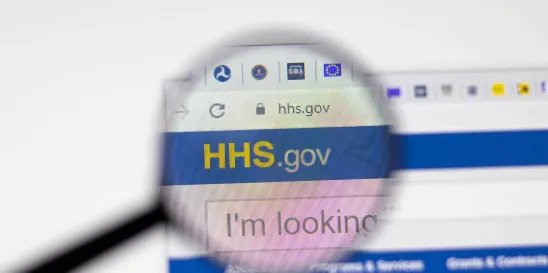On February 8, 2024, the U.S. Department of Health and Human Services (HHS) issued a final rule (Final Rule) updating federal “Part 2” regulations to more closely align the requirements applicable to substance use disorder (SUD) treatment records with the HIPAA privacy rule, and to make certain other changes. The regulations at 42 CFR Part 2 have long set forth strict rules governing the uses and disclosures of medical records of certain SUD treatment facilities and programs. HHS is now proposing to scale back those rules slightly, in accordance with statutory changes to federal law governing the privacy of SUD records in the 2020 “CARES Act” legislation enacted in response to COVID-19.[i] This Final Rule follows a proposed rule issued by HHS on December 2, 2022, which we previously analyzed here.
The Final Rule is anticipated to take effect on April 16, 2024 (60 days from the anticipated publication date of February 16). The compliance date by which individuals and entities must comply with the Final Rule’s requirements is February 16, 2026 (except as specifically tolled in the Final Rule).
Below we provide a high-level summary of the changes included in the Final Rule. We will supplement this analysis in the coming days with additional detailed reviews of certain of these changes referenced below.
The key updates in the Final Rule include:
- Consent: A long-standing tenet of the Part 2 regulations was that SUD records could not be used or disclosed without specific patient consent, except in very narrow circumstances. The Final Rule updates this regulation to allow a patient to give a single, broad consent that covers all future uses and disclosures of Part 2 records for treatment, payment, and health care operations purposes (as defined under the HIPAA privacy rule), subject to certain exceptions (hereinafter, “TPO Consent”). This alignment with the HIPAA privacy rule is an important development to streamline compliance with the previously incongruent consent regimens under the Part 2 and HIPAA regulations across health systems and Part 2 programs (as defined under the Part 2 regulations).
- TPO Consent Elements: The Final Rule indicates that a valid TPO Consent must have all of the required elements of a valid HIPAA authorization.
- Redisclosures: The Final Rule newly allows Part 2 programs, as well as HIPAA-covered entities and business associates, who have received Part 2 records in accordance with TPO Consent, to “redisclose the records as permitted by the HIPAA regulations” except in proceedings against a patient requiring a court order or specific written consent, or until the patient revokes the consent.
- SUD Counseling Notes: The Final Rule revises the definition of “SUD counseling notes” under the Part 2 regulations “to parallel the HIPAA psychotherapy note provisions,” which are subject to heightened confidentiality restrictions under Part 2 and HIPAA, respectively.
- Segregation/Segmentation of Part 2 Records: The Final Rule states that a Part 2 program, or HIPAA-covered entity or business associate, which receives Part 2 records based on a single TPO Consent, is “not required to segregate or segment such records.” This may be an important clarification for health systems and other entities that rely on integrated and unified electronic health records.
- Part 2 Record Breaches: Extends applicability of breach notification requirements consistent with those under HIPAA to breaches of Part 2 records.
- Civil and Criminal Enforcement: The Final Rule incorporates HIPAA’s criminal and civil enforcement authorities into the Part 2 regulations, allowing for imposition of civil money penalties and other sanctions available under HIPAA for Part 2 violations.
- Accounting of Disclosures: The Final Rule grants patients a new right to request an accounting of disclosures made by a Part 2 program based on a consent, for up to 3 years prior to the date of the accounting. However, the compliance date for this provision is tolled by HHS in the Final Rule until HHS revises the HIPAA privacy rule’s accounting for disclosures regulation to address disclosures through an electronic health record.
The Final Rule represents the latest in a series of efforts by HHS to more closely align HIPAA and Part 2 requirements and processes, in recognition of industry shifts to more integrated and coordinated medical, behavioral health, and SUD care. Health care organizations will need to assess the various provisions of the Final Rule closely to determine their compliance obligations and any necessary operational changes.
[i] Coronavirus Aid, Relief, and Economic Security Act, Pub. L. No 116-136, 134 Stat 281 (27 March 2020) (CARES Act) – https://www.congress.gov/116/bills/hr748/BILLS-116hr748enr.pdf (codified in pertinent part at 42 U.S.C. 290dd–2).




 />i
/>i
